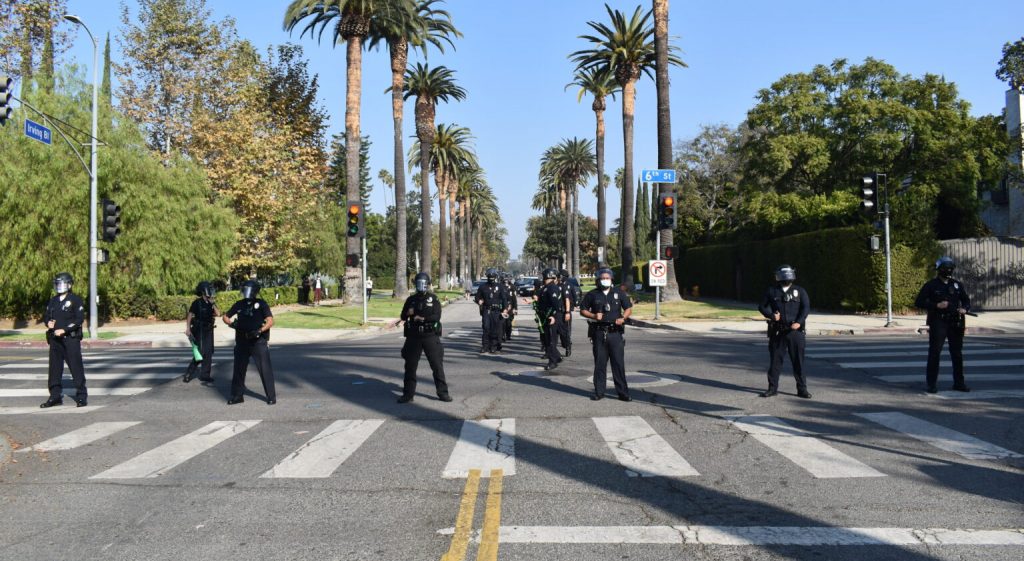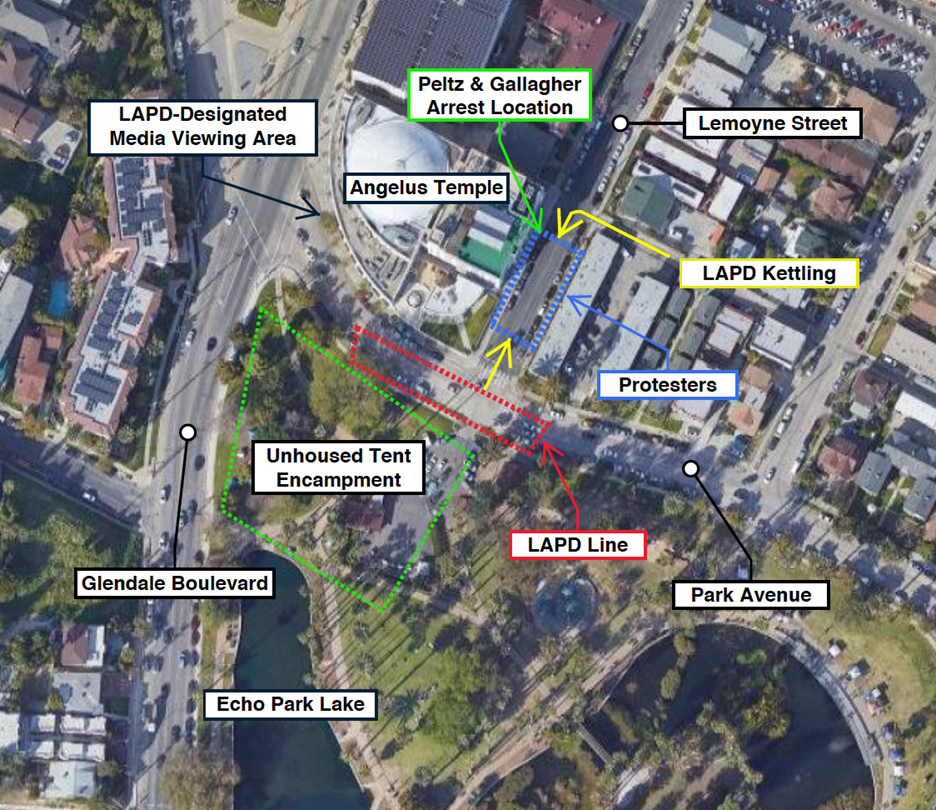The Press Freedom Project at UC Irvine Law School sued the City of Los Angeles for refusing to release body camera tapes of its officers violently beating Black Lives Matter protesters outside LA Mayor Eric Garcetti’s mayoral mansion.
The law clinic filed the lawsuit on behalf of Knock LA, an independent news organization, and the First Amendment Coalition. The lawsuit alleges that the Los Angeles Police Department’s refusal to disclose the tapes violates California’s 2019 police body cam transparency law.
“The LAPD is refusing to let the public see the tapes of officers hitting two non-violent women in the head with batons outside the mayor’s home,” said Susan E. Seager, director of UC Irvine School of Law’s Press Freedom Project.
“The Los Angeles City Council, Mayor Garcetti, the Police Commission, and City Attorney Mike Feuer should step in and order the LAPD to release these body cam tapes,” Seager said.
UC Irvine law student Leon He, who helped prepare the lawsuit, said that California Public Records Act should be respected by all government agencies. “Accountability through disclosure of police activity to the public is a right that police departments are bound to respect under the California Public Records Act,” he said.
The lawsuit alleges that on the morning of December 6, 2020, two groups of officers violently attacked non-violent protesters who were advocating that President Biden not appoint the mayor to a cabinet post, citing his failure to reform the LAPD. Garcetti’s wife, Amy Wakeland, made more than 80 complaints about the Black Lives Matter protests outside the family’s home during the months before the police action, according to the LA Times.
For journalists who cover policing in their communities, access to such recordings is crucial for keeping readers informed and holding law enforcement agencies accountable.
“Once again, we are forced to sue to do our jobs and give the public transparency,” said Cerise Castle, a Los Angeles journalist with Knock LA who faced blanket denials in response to her requests. “It begs the questions – what are they trying to hide, and for whose benefit?”
“When officers hurt people, the public has a right to the full story, not just the police department’s spin,” said David Loy, legal director of the First Amendment Coalition. “LAPD’s stonewalling is just one example of statewide resistance to police transparency.”
In recent years, the California Legislature has passed laws to pierce the veil of secrecy that for too long shielded police misconduct and use of force from public scrutiny. In recognition of the importance of press and public access to body cam, dash cam, and other recordings of violent use of force, lawmakers passed AB 748, which took effect in 2019 as part of the California Public Records Act, requiring disclosure of any audio or video recording of “critical incidents.” Critical incidents include any force that causes “great bodily injury.”
Secrecy, the lawsuit explains, can only be justified one year after the incident if there is an active administrative or criminal investigation, but the LAPD has not claimed that there is any such active investigation. No one was charged with any crime during the LAPD’s action against protesters on the morning of December 6, 2020, the lawsuit said.
The lawsuit asks the Los Angeles Superior Court to immediately direct LAPD to disclose the records sought by FAC and Knock LA and issue declaratory judgment that the records are subject to disclosure under state law.
The lawsuit alleges that LAPD officers inflicted “great bodily injury” on some protesters when breaking up the protest on December 6, 2020 incident, citing the protesters’ civil rights lawsuit against the city, Akili v. City of Los Angeles. Protester Emily Allers says in the lawsuit that an officer struck her in the back of the head with a baton, knocking her unconscious, and protester Shannon Thomas alleges in the lawsuit that another officer hit her in the face with a baton so hard that her teeth were loosened. Both women went to the hospital for treatment for their head injuries.
About the Press Freedom Project
The Press Freedom Project is a program of the Intellectual Property, Arts, and Technology Clinic at the University of California, Irvine, School of Law. The program teaches law students practical legal skills by pairing them with independent journalists and government watchdog groups and providing these clients with free legal services.

